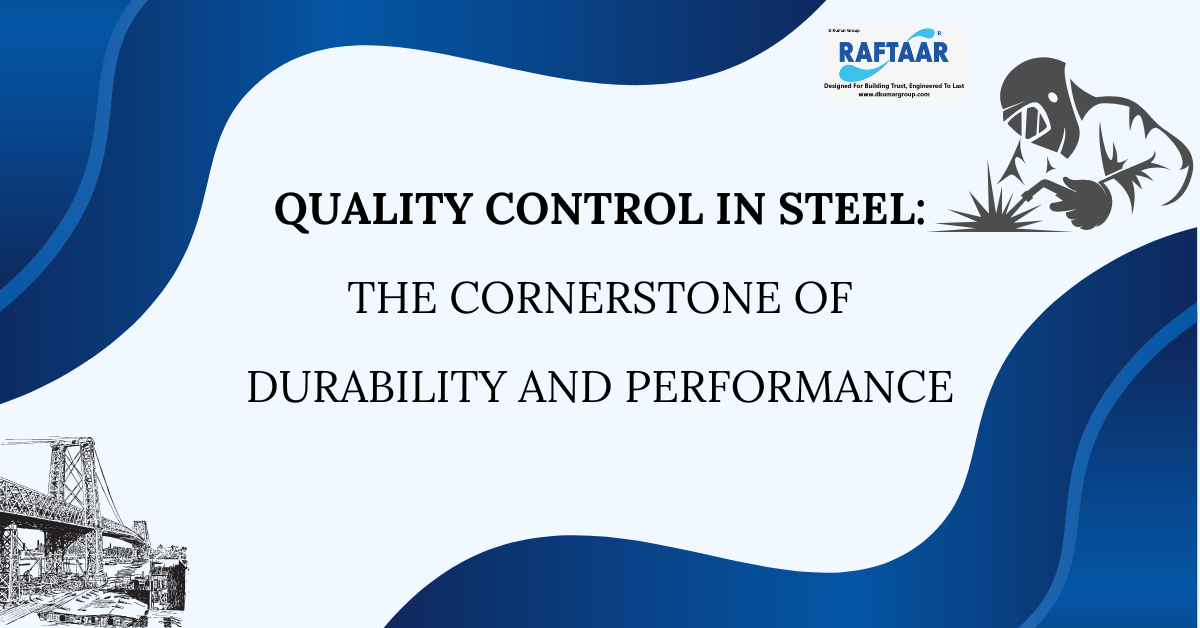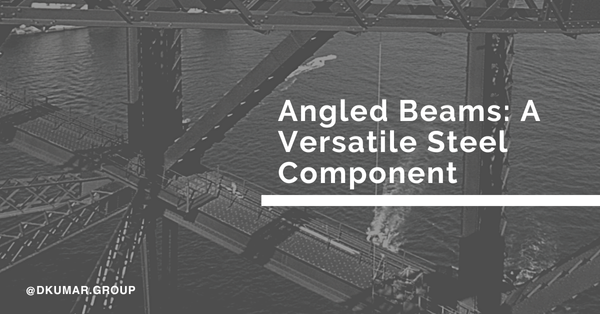Quality Control in Steel: The Cornerstone of Durability and Performance

Are you building a future that’s built to last? If you are not sure about this question, then there should be a moment of concern. Nowadays, construction projects require strong and reliable materials. Steel is a versatile and durable material; however, rigorous quality control measures should be taken into production to ensure the strength of steel structures.
Without the right strict quality control, even the highest-grade steel can compromise the integrity of the structure, and defects and inconsistencies can lead to major issues such as structural failures, safety hazards, and reduced lifespan. In some cases, the situation even gets worse, and it becomes a matter of public safety, environmental damage, and economic loss.
The solution to all these major problems is “Quality control” as it helps in ensuring the reliability, safety, and durability of the steel. In this blog, we will delve into the benefits of quality control and various aspects of quality control in the steel industry. Read this blog till the end to gain knowledge and ensure that the steel structures that shape our world are as strong and resilient as the foundations they support.
Steel: Backbone of Modern Construction
Steel has revolutionized the way we build and construct because of its exceptional strength, versatility, and durability. It has become an indispensable material in different industries, from construction and automation to intricate machinery and energy.
To use the steel to its full potential and to ensure safety, it is essential to keep an eye on its quality. Quality control in the steel industry involves a rigorous process of testing and inspection to ensure the right final product meets the necessary standards.
A single flaw in a steel component can have major consequences and by prioritizing quality control, the steel industry can mitigate the major risks associated with it and safeguard lives and property.
Implementing quality control measures in the steel industry helps in producing high-quality products according to the needs of customers while ensuring the safety and reliability of these steel components.
Steel production involves multiple stages and each stage should be carefully monitored to maintain product quality. Some of the major stages include:
- Ironmaking: It involves a blast furnace and direct reduced iron (DRI). The quality of iron produced in the blast furnace is monitored based on parameters like pressure, temperature, and gas composition. The quality of DRI is assessed based on iron, content, particle, size, impurities, and other such factors.
- Steelmaking: It majorly involves an electric arc furnace (EAF) and a basic oxygen furnace (BOF). For the EAF, the power input and electronic consumption are the critical factors, and for BOF, the oxygen lance position, slag composition, and temperature are closely monitored to achieve the desired steel composition.
- Rolling and Finishing: it involves surface quality inspection and thickness and width control. Automated systems and visual inspection are used to encounter surface defects on the products. The thickness and width of role products are measured to ensure they need required tolerances.
Benefits of Quality Control in Steel
Enhanced Durability
Quality control is the foundation of produced steel that can stand the test of time. Hence, by implementing the right testing and inspection procedures, steel manufacturers can enhance the durability of the final products.
Quality control measures lead to stronger and more resilient steel by ensuring the following points:
- Metallurgical Analysis: This helps in identifying potential inconsistencies and defects that allow manufacturers to take corrective actions at the right time.
- Chemical Composition: Controlling the composition of steel, using the right approach, helps in ensuring optimal mechanical properties such as ductility or strength.
- Mechanical Testing: This helps in assessing the performance of the steel under real-world conditions, when they are being manufactured.
Quality control can also extend the lifespan of steel structures:
- Fatigue Resistance: Quality control helps in identifying fatigue-prone areas in the steel and by doing so, manufacturers can address the issues around it and enhance the fatigue resistance of steel components.
- Corrosion Resistance: Quality control measures also help in minimizing the risk of collision which is considered a major factor in the degradation of steel components and structures.
- Reduced Maintenance Costs: High-quality steel does not require frequent maintenance and repairs, leading to the use of steel components for a long field of time and significant cost savings.
Consistent Performance
Quality control helps in enhancing the performance of steel components. By appearing to the testing and inspection protocol of the testing procedures, manufacturers ensure that steel components deliver consistent and reliable performance under diverse conditions.
- Temperature Extremes: Quality control helps ensure that steel structures can withstand different temperature ranges from high to low without compromising structural integrity.
- Dynamic Loads: Steel components, such as those in bridges and machinery are subjected to dynamic loads and must be manufactured, ensuring they can handle extreme stress cycles.
- Weathering: Quality control helps ensure that the steel components can endure and withstand harsh environmental conditions.
At DKumar, by adhering to strict quality standards, we ensure that the steel performs reliably across various conditions, reducing the risk of failure.
Reduced Costs
Quality control not only helps with product quality but also helps in reducing costs. By identifying and rectifying flaws and defects early in the production process, manufacturers can minimize waste, improve efficiency, and significantly reduce production costs.
Early detection of flaws also helps in proactive maintenance and avoiding product recall which can be extremely costly and damage a company’s reputation. Apart from this, it helps in satisfying the customers and satisfied customers are more likely to repeat business, reducing marketing and sales costs and generating long-term revenue.
- Improved Production Efficiency: Well-implemented quality control measures helps streamline the production process, which minimizes the production time and leads to increased efficiency.
- Efficient Resource Utilization: Quality control helps in optimizing the use of raw materials, labor, and energy, which leads to reduced waste.
- Reduced Scrap Rates: Identifying and addressing the defects early in the steel components helps reduce the number of defective products which leads to reduced scrap rates.
Compliance with Standards
Adhering to industry standards and safety regulations is essential in the steel industry as along with ensuring the quality and safety of the steel products, it also ensures the good health of the environment and public.
Importance of Compliance
- Industry Standards: By complying with industry standards, such as those established by ISO or ASTM international, manufacturers ensure their products meet global quality standards and benchmarks.
- Product Safety and Reliability: Compliance with necessary standards, guarantees that steel components meet the right quality and performance criteria. This helps in building trust among consumers and minimizing the risk of failures.
- Environmental Protection: Adhering to regulations specific to the environment helps reduce the industry’s impact on the environment, which leads to the conservation of resources and reduced pollution.
- Certification: Obtaining certificates from recognized organizations acts as proof to validate the quality and performance of steel products.
If your organization is not following the necessary regulations, there can be potential risks for such non-compliance, which include:
- Safety Hazards: Steel products that are non-compliance with the regulations can often pose serious safety risks.
- Product Liability: Non-compliance can lead to product liability claims which results in significant financial losses.
- Market Access Restrictions: Non-compliance can affect market access or international business as many countries impose strict quality and safety standards on imported products.
- Environmental Damage: Non-compliance with environmental regulations can affect nature and result in environmental damage and fines.
Role of Quality Control in Ensuring Compliance
- Testing and Inspection: Rigorous testing and inspection procedures help in identifying and addressing any non-conformities.
- Continuous Improvement: Implementing continuous improvement processes or approaches helps in constant upgradation of the products.
- Documentation and Record-Keeping: Documenting and maintaining accurate records of testing, inspection, list of defects, and corrective actions plays a major role and is essential for demonstrating compliance.
Increased Customer Satisfaction
Customer satisfaction is the ultimate goal of any business. Instead in industry, delivering high-quality products acts as a path to customer satisfaction. Such products ensure reliable performance by minimizing downtime, longevity, and consistent quality.
By delivering reliable and durable products, you can build trust and confidence among your customers. This also helps in creating a positive brand image and enhancing it over time by attracting new customers.
Conclusion
Control is one of the most essential aspects of the steel industry which helps in ensuring that the materials you rely on for the infrastructure and lives are safe, durable, and reliable.
By implementing regret, testing, and monitoring procedures, steel manufacturers produce high-quality products that meet the necessary regulations and provide immense benefits, which include
- Enhanced Durability
- Consistent Performance
- Reduced Costs
- Compliance with Standards
- Increased Customer Satisfaction
As a consumer, you should choose the right product from reputed manufacturers who prioritize quality control in their process and production. By choosing high-quality steel, you can contribute to the construction of safer, long-lasting, and more sustainable infrastructure.
So, are you ready to invest in quality steel? Contact DKumar today about our commitment towards excellence and let’s discuss how we can help you achieve your project goals.




